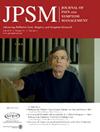“He Said He Wouldn't Want This”: Is Minimal Comfort Feeding Viable?
IF 3.2
2区 医学
Q2 CLINICAL NEUROLOGY
引用次数: 0
Outcomes
1. Identify the practical and ethical challenges presented by both Comfort Feeding Only (CFO) and Stopping Eating and Drinking by Advance Directive (SED by AD) as options for people who want to ensure that they do not continue living with advance dementia.
2. Define the basic tenets of Minimal Comfort Feeding and describe the ethical considerations and operational challenges that may accompany its implementation.
Key Message
The provision of nutrition and hydration to those with advanced dementia is often ethically complex. This session will explore a new approach to providing food and liquids to people who have previously expressed a wish not to continue living with advanced dementia.
Abstract
In 2010, Comfort Feeding Only (CFO) was introduced as an alternative to feeding tubes, and since then has been shown to be appropriate for most patients with advanced dementia. However, CFO's emphasis on assiduous handfeeding (that may prolong life for years) fails to accommodate the preferences of those who do not want to continue living with this illness. Some have proposed advance directives instructing caregivers to completely halt the provision of nutrition and hydration once a person has reached an advanced stage of dementia. However, these directives may fail to address patients’ physical discomfort and caregivers’ ethical and clinical obligations.
Objectives
In this interactive session, a panel of clinicians, caregivers, patient surrogates, hospice leaders, and researchers will introduce Minimal Comfort Feeding (MCF) and its ethical basis, parameters, benefits and challenges. With MCF, it is proposed that caregivers provide nutrition and hydration only in response to signs of hunger and thirst, rather than offering food and liquids proactively as with CFO. Considerations regarding patient selection (particularly within vulnerable populations), surrogate responsibility, family/caregiver education and support, potential conflicts of interest, and regulatory concerns will be explored.
Conclusion
Audience feedback regarding MCF and its possible implementation will be gathered using an Audience Response System if supported/allowed by the Planning Committee. These responses, together with robust discussion off this potential innovation in goal-concordant care with a panel representing diverse and typically under-represented communities, will contribute to an emerging understanding of MCF and its acceptability in both private and institutional settings.
References
1. Palacek EJ, Teno JM, Casarett DJ, Hanson LC, Rhodes RL, Mitchell SL. Comfort feeding only: a proposal to bring clarity to decision-making regarding difficulty with eating for persons with advanced dementia. J Am Geriatr Soc. 2010 Mar;58(3):580-4. 2. Menzel PT, Chandler-Cramer MC. Advance directives, dementia, and withholding food and water by mouth. Hastings Cent Rep. 2014 May-Jun;44(3):23-37. 3. Wright JL, Jaggard PM, Holahan T; Ethics Subcommittee of AMDA–The Society for Post-Acute and Long-Term Care. Stopping Eating and Drinking by Advance Directives (SED by AD) in Assisted Living and Nursing Homes. J Am Med Dir Assoc. 2019 Nov;20(11):1362-1366. 4. Board of Directors; Laxton CE. AMDA Updated Statement on Stopping Eating and Drinking by Advance Directives (SED by AD). J Am Med Dir Assoc. 2023 Mar;24(3):321. 5. Haimowitz D, Pope TM. SED by AD: Prepare to Respect Patient Wishes. J Am Med Dir Assoc. 2023 Oct;24(10):1518-1519. 6. Levine M, Bern-Klug M. “They Make the Will, But They Want the Food:” Staff Perspectives on Challenges in Implementing Dementia Advance Directives Related to Stopping Feeding. Journal of Social Work in End-of-Life & Palliative Care. 2024 1–22.
求助全文
约1分钟内获得全文
求助全文
来源期刊
CiteScore
8.90
自引率
6.40%
发文量
821
审稿时长
26 days
期刊介绍:
The Journal of Pain and Symptom Management is an internationally respected, peer-reviewed journal and serves an interdisciplinary audience of professionals by providing a forum for the publication of the latest clinical research and best practices related to the relief of illness burden among patients afflicted with serious or life-threatening illness.

 求助内容:
求助内容: 应助结果提醒方式:
应助结果提醒方式:


